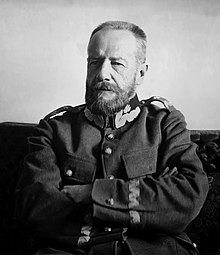Lucjan Żeligowski
Lucjan Żeligowski | |
|---|---|
 | |
| Leader of the Republic of Central Lithuania | |
| In office October 12, 1920 – March 24, 1922 | |
| Preceded by | Part of Lithuania |
| Succeeded by | Merged into Poland |
| Personal details | |
| Born | October 17, 1865 Nieśwież, then Russian Empire, now Belarus |
| Died | July 9, 1947 (aged 81) London, England |
| Nationality | Polish |
Lucjan Żeligowski | |
|---|---|
| Years of service | from 1885, Russian Army |
| Rank | Generał broni |
| Commands held | Front Commander Head of State of Central Lithuania Minister of Military Affairs |
| Battles/wars | Russo-Japanese War, Great War, Polish-Ukrainian War, Polish-Bolshevik War, Invasion of Poland in World War II |
| Awards | |
| Other work | Member of Parliament |
Lucjan Żeligowski (1865-1947), was a Polish general, and veteran of World War I, the Polish-Soviet War and World War II. He is best remembered for his role in the Żeligowski's Mutiny and as head of a short-lived Republic of Central Lithuania.
Biography
Lucjan Żeligowski was born October 17, 1865, in Nieśwież (modern Niaśviž in Belarus) to Gustaw and Władysława née Traczewska. After graduating from military officers' school in 1885, he joined the Russian Army, where he served at various staff and command posts.
He fought in the Russo-Japanese War of 1904-1905.
During the First World War he served as a lieutenant colonel and commanding officer of a Russian rifle regiment.
Fighting against the Bolshevists
After the February Revolution of 1917, Żeligowski became one of the organizers of the Polish Army in Russia. Initially commander of an infantry regiment in the ranks of the Polish 1st Corps, he was quickly promoted and given command over a brigade. In 1918 he started the creation of a Polish unit in the area of Kuban, which eventually became the 4th Polish Rifle Division. As part of the Polish Army, his unit fought alongside the Denikin's Whites in the Russian Civil War. In October of the same year he became the Commander in Chief of all the Polish units fighting in Russia.
After the outbreak of the Polish-Bolshevik War and the defeat of Denikin, Żeligowski's unit was ordered to retreat to Romanian Bessarabia, where it took part in defence of the border against Bolshevik raids. Finally, in April of 1919, the division was withdrawn to Poland, where it was incorporated into the Polish Army and renamed to Polish 10th Infantry Division.
During the war against the Bolshevist Russia, Żeligowski, a personal friend of Polish C-i-C Józef Piłsudski, was quickly promoted to general and given the command over an operational group of his name, composed of his 10th division and additional units, mostly of partisan origin. As such, he soon became the commanding officer of the entire Lithuanian-Belarusian Front, operating in the area of Polesie and the Pinsk Marshes. During the Battle of Warsaw his unit was attached to the 3rd Polish Army and took part in the pursuit of fleeing Red forces and the Battle of the Niemen.
Republic of Central Lithuania
In October of 1920, Żeligowski, a native of historical lands of Lithuania, was chosen to command the 1st Lithuanian-Belarusian Infantry Division, composed mainly of P.O.W. members, volunteers and partisans from the territory of modern Belarus and Lithuania. On October 8, 1920, after a staged coup, he defected with his unit and took control over the city of Wilno (modern Vilnius, Lithuania) and its area. The coup, named after him, would be remembered as the defining moments of his life. On October 12 he proclaimed independence of the said area as Republic of Central Lithuania, with Wilno as its capital. Initially a de facto military dictator, after the parliamentary elections he passed his powers to the newly-elected parliament, which in turn decided to submit the area to Poland.
Later life

After the annexation of Central Lithuania to Poland, Żeligowski continued his service in the Polish Army. Promoted to three star general in 1923, he served as an army inspector, or a commander of a military district of Warsaw. In 1925 he also became the Polish Minister of Military Affairs. Ousted by Piłsudski's coup d'état (the May Coup), he was soon returned to the post. He retired the following year and settled in his family manor in Andrzejewo near Wilno.
In 1930 he published a book containing his memoirs of the Polish-Bolshevik War named War of 1920: Memories and thoughts (Wojna w roku 1920. Wspomnienia i rozważania). He also wrote numerous articles on the conflicts of early 20th century for a variety of Polish newspapers. In 1935 he was elected a member of parliament and remained in the Sejm until 1939.
World War II
During the Invasion of Poland in 1939, Żeligowski volunteered for the Polish Army, but was not accepted due to his old age (he was 74 at that time) and poor health. Nevertheless, he served as an advisor to the command of the Polish southern front. After the Polish defeat, he evaded being captured by the Germans and the Soviets and managed to reach France, where he joined the Polish Government in Exile. An active member of the Polish National Council, an advisory body, he escaped to London after the French defeat in 1940.
After the end of Second World War he declared he would return to Poland, but he suddenly died on July 9, 1947, in London. His body was returned to Poland, and Żeligowski was buried in the Powązki Cemetery in Warszawa. He was an honorary citizen of Warszawa.
